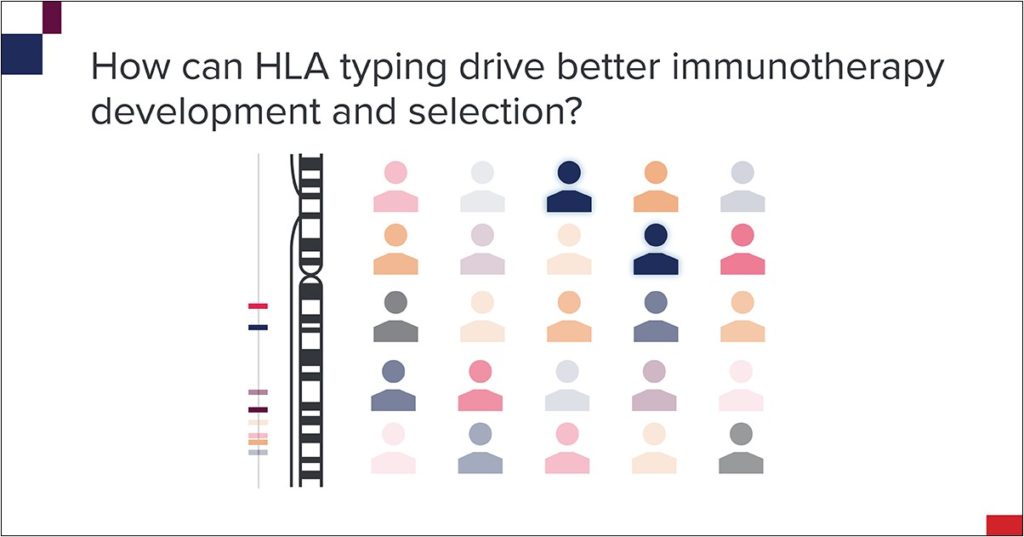December 6, 2023

Immunotherapies hold enormous potential for cancer treatment, but understanding tumor–immune interactions is needed to successfully develop new therapies and identify suitable patients.
Human leucocyte antigen (HLA) typing gives deeper insights into the relationship between the immune system and cancer cells, helping scientists improve immunotherapy administration precision and develop new immunotherapeutic approaches. But what is it?
A deeper dive into HLA typing
HLAs are a combination of different single nucleotide polymorphisms (SNPs) across multiple exons. The HLA system helps the immune system distinguish between self and non-self cells by presenting antigens derived from pathogens, cancer cells, or other foreign entities to immune cells, triggering a response. HLAs are therefore pivotal in cancer immunotherapy — cancer-specific antigens are presented on HLA molecules, which T cells recognize, attack, and kill.
HLA allele and antigen composition varies significantly between individuals, however, so determining their HLA profile — HLA typing — is essential to understand disease onset, progression, and treatment.
How is HLA typing performed?
Most researchers use Sanger sequencing for HLA typing, which detects SNPs. But since both copies of the genes are sequenced together in one reaction, researchers struggle to identify whether the SNPs come from the same (cis) or the opposite (trans) chromosome, making establishing the correct HLA type difficult. Next-generation sequencing (NGS) overcomes cis/trans polymorphism ambiguities by independently identifying and amplifying individual DNA fragments for more accurate typing.
HLA typing in action
Three recent publications highlight the impact of HLA profiling in immunotherapy development:
1. Immunotherapy in oncology
HLA type affects an individual’s susceptibility to infections or autoimmune diseases, or their oncological immunotherapy response. A 2019 publication discussed how understanding a patient’s HLA profile is vital to effectively tailor immunotherapeutic treatments. Particularly, researchers should match the HLA types of cancer patients with potential donor HLA types to improve the success of treatments like adoptive cell therapy or stem cell therapy.
HLA typing is essential in CAR T-cell therapy, where it helps in the engineering of T cells to target tumor antigens, expanding immunotherapy applications beyond standard treatments.
2. Precision medicine
HLA genotyping can help researchers to predict the survival of HLA alleles among cancers, based on an underlying cytolytic activity (CYT) mechanism. A recent study showed that a strong HLA allele, in combination with a high tumor mutation burden, could stimulate intensive immune CYT and lead to extended HLA survival. As HLA profiles differ between patients, typing can therefore support oncologists in selecting the most appropriate immunotherapy for an individual.
3. Viral associated cancer
The 2019 article also highlighted that carcinogenic viruses activate genes that allow cancer cells to escape immune surveillance and proliferate uncontrolled. A patient’s HLA profile plays a significant role in these immune escape mechanisms, leading to the initiation of such cancers and influencing immunotherapy response. Understanding HLA profiles can therefore help effective cancer vaccine design, improving patient outcomes.
Immunotherapy is a promising approach to treat cancers — and HLA typing is key to unlocking its potential. With HLA typing, researchers can better tailor therapies, select the right treatment, and design more effective cancer vaccines.
NGS is critical to getting clearer results from your HLA typing.
Future of HLA Typing: Artificial Intelligence and Predictive Algorithms
As HLA typing evolves, the integration of AI and machine learning is becoming key to advancing immunotherapy.
These technologies are being used to develop predictive models that combine HLA typing with tumor mutational burden (TMB), and other biomarkers, to forecast patient responses to immune checkpoint inhibitors.
This multidisciplinary approach is expected to revolutionize the personalization of cancer treatments.
At CellCarta we developed our own data analysis pipeline to evaluate immune checkpoint biomarkers by looking at RNA sequencing data.
Discover CellCarta’s genomics services.
About the author:

Nathalie Bernard (PhD) is the scientific business director for the Genomics Services unit within CellCarta. Her background is in molecular biology, and she has many years of experience in PCR and sequencing, technologies used to discover or identify DNA and RNA biomarkers of clinical utility. At CellCarta, Nathalie is using her expertise to guide our customers in finding the best solution to their genomic questions.
You might also be interested by
CellTalk Blog
Leveraging Preclinical Genomic Insights for Successful Therapeutic Development
August 18, 2025
Genomics
More infoCellTalk Blog
Immortalizing Your Samples: The Power of Dual Extraction in Pre-Analytical Planning
August 18, 2025
Genomics
More infoCellTalk Blog
Maximize Sample Value with Combined IHC and RNAseq Analysis
August 18, 2025
Genomics
More infoWeb News
Biofidelity and CellCarta partner to deploy Aspyre® Lung in global clinical trials
January 9, 2025
Genomics
More info